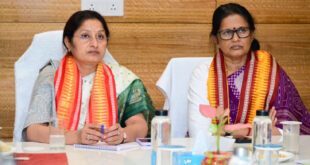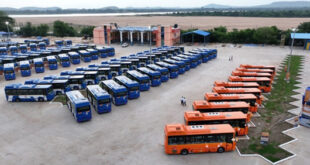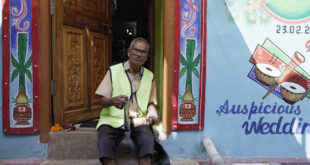Fundamentalism, the Dividing Line (A Case Study of Afghanistan)
New Delhi, December 6, 2021: Vishwagram, Muslim Rashtriya Manch, and The Forum for Awareness of National Security will be organizing an International Conference jointly, titled Global Terrorism v/s Humanity, Peace, and Possibilities — Fundamentalism: The Dividing Line (A Case Study of Afghanistan) on 11th December 2021, between 9 AM to 6 PM at the Stein Auditorium, India Habitat Centre, Lodhi Road, New Delhi.
It is being organized under the patronage of Dr. Indresh Kumar (National Executive Member, RSS), Shri Arif Mohd. Khan (Hon’ble Governor, Kerala), Swami Chidanand Saraswati (Parmarth Niketan), and Dewan Syed Zainul Abedin Ali Khan (Spiritual Head, Ajmer Sharif Dargah). The conference’s board of conveners includes Prof. Geeta Singh, Prof. R.B. Solanki, Shri Ashok Sajjanhar, Shri Nagendra Chaudhary, Shri Mohd. Afzal, Prof. Shahid Akhtar, Prof. Sanjeev Kumar H.M., Prof. M. Mehtab Alam Rizvi, Shri Pravesh Khanna, and Shri Vikkramaditya Singh. Noted national universities like Aligarh Muslim University, Jamia Millia Islamia, Jamia Hamdard, Maulana Azad National Urdu University, and Central University of Kashmir are the event’s partners.
To brief the media,about the forthcoming conference, a Press Conference was held on 6th December 2021 at 2.30 PM at the Constitution Club, New Delhi. Briefing the media delegates, Dr. Indresh Kumar shared his vision about the conference by observing: “The world continues to confront the pressing problems of terrorism, violence, and fundamentalism. Owing to these, we still witness the emergence of repressive regimes and intolerant societies which coercively oppress their own populations in the name of religious fundamentalism. The Taliban in Afghanistan has surfaced as the most recent manifestation of this scenario, representing one of the most horrendous expressions of the challenge of global terrorism to the existence of humanity.
“In order to confront such a challenge, our approach must be to deal with the larger problem of global terrorism with the transcendental instrument of human values. India, a land of multiple faiths, a tolerant and inclusive culture, and a vibrant society that prides itself on its many festivals, can show the way forward in this regard. The conception of India as a land of cohesive cultures can provide an apt global model for creating an inclusive society”, added Dr Kumar.
Speaking to the media, Prof. Geeta Singh, Director of the Centre for Professional Development in Higher Education, Coordinator of Vishwagram and member of the board of conveners for the conference, quoted, “When the Taliban ran over Afghanistan, fearful women were seen scampering to stock their burqas, well aware of the primordialist chains that were set to clasp them and drag them away from their hopes of progress. In order to comprehend the tremendous threat that fundamentalist terror poses to one half of humanity, one merely needs to recall the grotesque physical, mental, and social horrors suffered by the women who fell prey to ISIS not too long ago. South Asia ironically remains one of the most fertile grounds for Islamist fundamentalism and the terrorism it creates despite being home to millions of Muslims, a melting pot of cultures, and an engine of Asia’s economy.”
“From the Taliban to HuJI, Lashkar-e-Taiba to Indian Mujahideen, some of the world’s most notorious and violent peddlers of jihad have thrived in the region by feeding off the socio-economic strife and insecurities of everyday Muslims. Many such jihads within the region have worryingly emanated from India’s immediate neighborhood, curbing which has remained a lasting priority for New Delhi.”
In accordance, the conference note highlights that the security threats proliferating beyond Afghan borders may head towards India too, especially via Pakistan-occupied Kashmir. With such a fragile scenario at hand, it is only necessary for the best of minds to come together to deliberate on solutions and possibilities for lasting peace and security. In this context, the conference note also raises a significant question: can the prospect of prosperity enable resistance to the very idea of terror? As quoted by Prof. Geeta Singh, “Being a civilizational giant that binds all lands between Kailash and Kanyakumari, India has long prescribed two of its most enduring philosophical prescriptions to the world, which are Sanatan Dharma (eternal duty) and Vasudhaiva Kutumbakam (the world as one family). The transcendental idealist spirit binding these two dictums is the didactic conception, ‘सर्वे भवन्तु सुखिनः सर्वे सन्तु निरामयाः। सर्वे भद्राणि पश्यन्तु मा कश्चिद्दुःखभाग्भवेत्। ॐ शान्तिः शान्तिः शान्तिः,’ which is a prayer to the almighty for the sustenance of eternal peace and prosperity for all the world. With such benevolent values to project, can Maa Bharati not contribute to the global quest to counter terrorism with development by setting examples in its own region?”
The conference seeks to address such pressing questions on global terrorism by bringing academics and practitioners under one roof to brainstorm on them with a solution-oriented drive. The broad themes to be discussed at the event are as follows:
Global Terrorism and the Dividing Line of Fundamentalism Human Rights Crisis in Emerging Terrorism Role of International Institutions and World Powers in the Present Afghanistan Crisis Issues of Human Values, Peace, and Security The Vision Ahead: Joint Efforts to Curb Terrorism
 Odisha Samachar Odisha Breaking News , Odisha Current News , Odisha News
Odisha Samachar Odisha Breaking News , Odisha Current News , Odisha News



